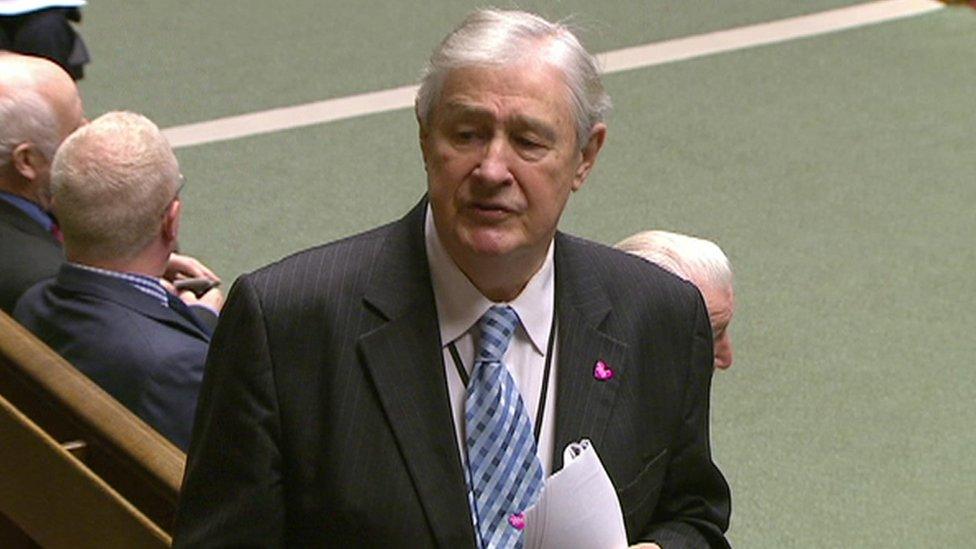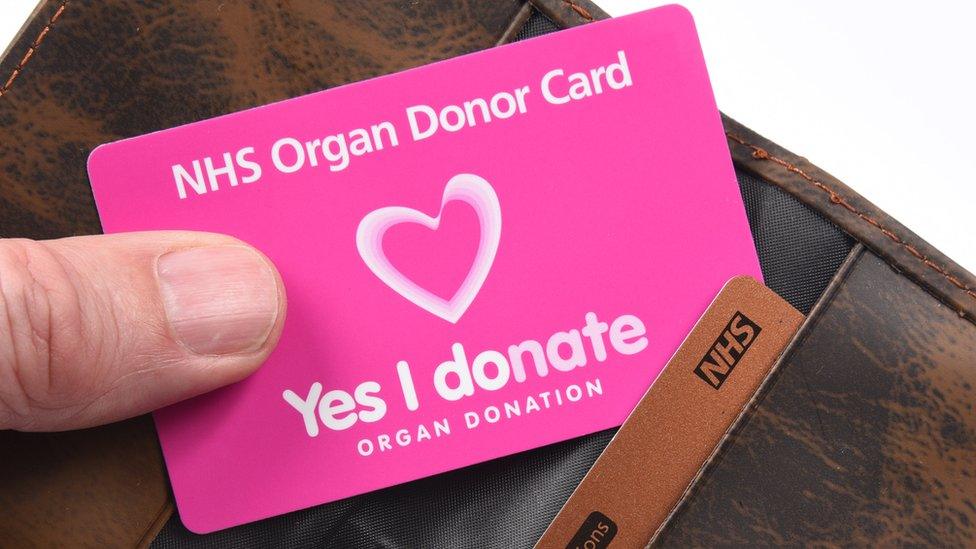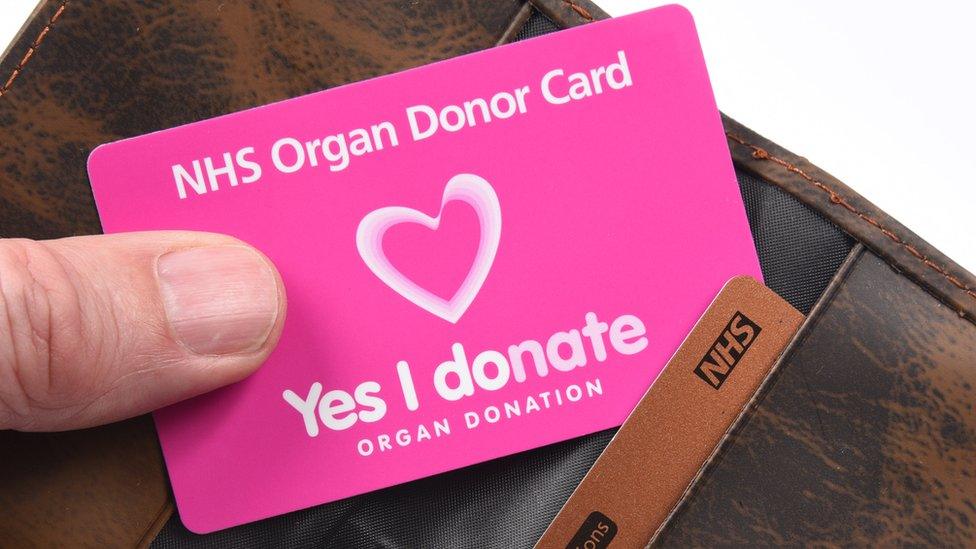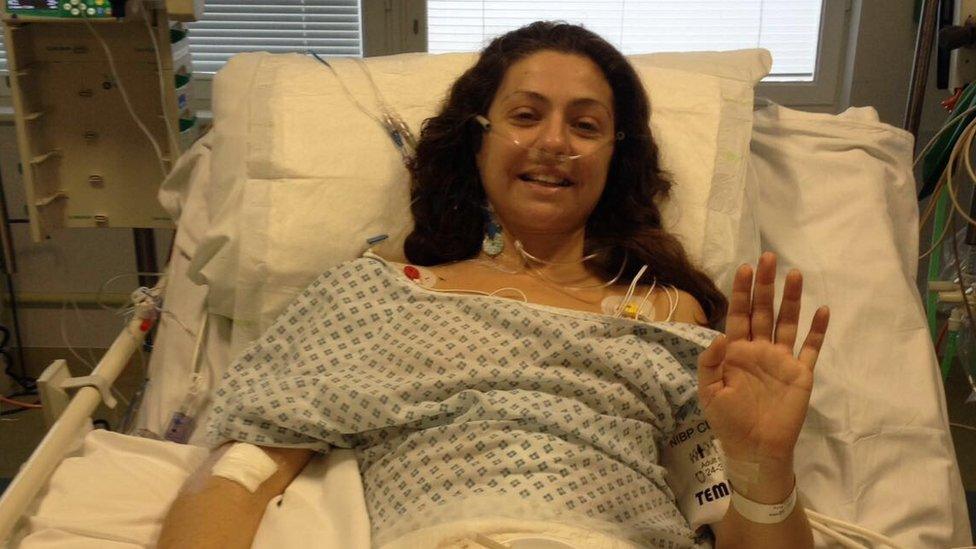Bid to change organ law gets initial backing from MPs
- Published
- comments
Labour MP: What happened to Rebecca could happen to anyone
Plans to change the rules on organ donation consent in England, which it is claimed could save up to 500 lives a year, have been backed by MPs.
A bill requiring people to "opt out" if they do not want their organs used passed its first parliamentary hurdle.
Labour's Julie Elliott, whose daughter is receiving dialysis for a serious kidney disease, said it would give hope to thousands of transplant patients.
The MP said her experience had made her realise how "special" donors were.
Labour MP Geoffrey Robinson's private members' bill, which would bring England into line with Wales which already has an opt-out system for consent, passed its second reading on Friday.
The government has said it "wholeheartedly" supported the bill, which it said would be referred to the changes as Max's Law, after nine-year-old Max Johnson, who benefited from a heart transplant.
Allow X content?
This article contains content provided by X. We ask for your permission before anything is loaded, as they may be using cookies and other technologies. You may want to read X’s cookie policy, external and privacy policy, external before accepting. To view this content choose ‘accept and continue’.
There are 25 million people on the organ donation register but 6,500 patients are waiting for a transplant.
At the moment in England, organs can only be used if explicit approval is given, either by signing the register or if the deceased had told a family member of their desire to donate.
The UK government is consulting on introducing an opt-out system while Scotland is currently looking at bringing forward similar legislation.
Mr Robinson told MPs that while levels of organ donation were considerably higher than a decade ago, the UK had some of the lowest rates of consent in Western Europe and a "certain inertia" had set in.
According to NHS figures, he said about 500 people were dying every year due to a lack of suitable donors.

Geoffrey Robinson said he had been "guilty" for some time of thinking of registering but not doing so
"This is not good enough. I believe we can do better and be pioneers in making transplants more effective."
While changing the law would "not make an immediate difference", he said if the bill was passed by the end of the year it would increase the availability of organs over time and help give more people "a new lease of life".
He also said he hoped it would make it easier for families to openly discuss the issue.
"None of us likes to think about the worst happening," he said. "It is challenging to have conversations with loved ones about their wishes after death.
"We know that it is at that moment when families are confronted with the awful situation that very often they back off, sometimes over-riding the wishes of the deceased who happens to be a registered donor."
Ms Elliott, the MP for Sunderland Central, said her family's life had been transformed by her previously healthy 36-year old daughter Rebecca's diagnosis with a serious kidney complaint in late 2016.
"What happened to us over the last 18 months could happen to anyone, rich or poor... and highlights the reality of the need to change the law to a position of deemed consent," she said.
"From hopefully one day the family member of a recipient, I want to say (to donors) thank you very much from the bottom of my heart - you are very special people."
"Let us make the change in the law to save more lives of the thousands waiting for transplants."
Change of mind
Under the bill's "soft opt-out" proposals, the wishes of families and next of kin would continue to be respected, so removal of organs would not go ahead without their support.
There would be exemptions for under-18s and adults not able to make informed decisions.
Labour leader Jeremy Corbyn made a brief appearance in the Commons to urge MPs to support the "wonderful" measure which he said would "save an awful lot of people's lives".

In Wales, where an opt-out system was introduced in December 2015, there has actually been a small dip in the number of deceased donors, from 64 in 2015-16 to 61 in 2016-17.
This resulted in a drop in organ transplants from 214 to 187 respectively.
Former Welsh Secretary Cheryl Gillan said it would be wrong to describe the experience in Wales as a failure.
But the Conservative MP said families should have a "certain latitude" to change their mind at what was obviously a very sensitive time following the death of a loved-one.
- Published15 February 2018

- Published12 January 2018
